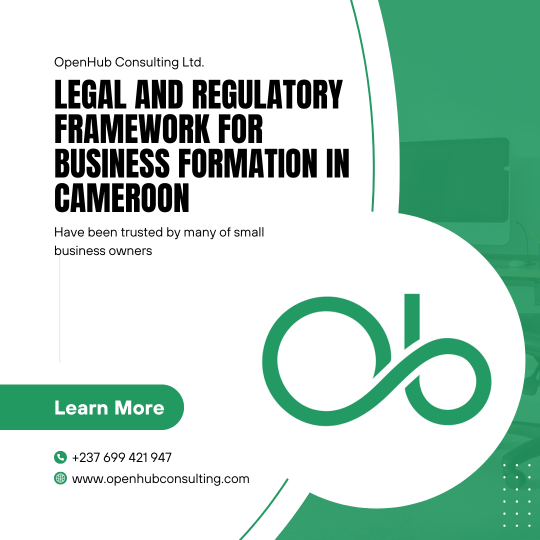
How to start a daycare center in Cameroon
November 12, 2022
Benefits of Using Us for Business Registration in Cameroon
July 6, 2023Understanding tax laws and regulations is essential for businesses operating in Cameroon. Failure to comply with tax requirements can result in hefty fines and legal consequences, which can negatively impact a business’s financial stability and reputation.
In this comprehensive guide, we will provide an overview of tax laws and regulations in Cameroon, including the types of taxes that businesses are required to pay, how taxable profits are determined, and common tax planning strategies.
Overview of Tax Laws and Regulations in Cameroon
The tax laws and regulations in Cameroon are governed by the General Tax Code, which outlines the rules and procedures for the assessment and collection of taxes.
All companies and other corporate bodies operating in Cameroon are required to pay company tax on all profits or income earned from businesses carried on or transactions effected in Cameroon.
The taxable profits are determined according to the results of all transactions of any kind effected by the undertaking during the period of assessment, including the transfer of any assets in the course of or on the completion of trading.
The net profit shall consist of the difference between the value of the net assets at the closing and opening of the period, whose results will serve as a basis for assessment. This will be reduced by the additional assets brought in and increased by the drawings effected by members during this period.
The net taxable profit shall be established after deduction of all expenses directly entailed by the exercise of activities subject to assessment in Cameroon.
Undertakings headquartered in Cameroon or with effective management office in Cameroon, undertakings that have a permanent establishment in Cameroon, and undertakings that have a dependent representative in Cameroon shall be deemed to be operating in Cameroon.
Stocks shall be valued at cost price, and if the market price is lower than the cost price, the undertaking shall make provisions for depreciation of stock. Work in hand shall be valued at cost.
It is important to note that taxable profits shall be determined with sole regard to profits earned by businesses carried on or transactions effected in Cameroon, subject to the provisions of international conventions.
The legal framework for tax laws and regulations in Cameroon are overseen by the Ministry of Finance and the Directorate General of Tax, which ensure compliance and enforce penalties for non-compliance.
In the following sections, we will provide a more detailed explanation of the different types of taxes that businesses are required to pay in Cameroon.
Also, we will share with you common tax planning strategies that can help businesses optimize their financial management and stay compliant with local tax laws and regulations.
| Small Business Tax Management Services
| Bookkeeping Services for Small Businesses
| Accounting Services for Small Businesses
Company Tax in Cameroon
The company tax is a tax on profits or income earned by companies and other corporate bodies operating in Cameroon.
It’s assessed on all taxable transactions in Cameroon and is based on the profits realized during the twelve-month period corresponding to the financial year.
The tax rate is generally 30%, but businesses with a turnover equal to or below XAF3 billion are subject to a reduced rate of 25%.
The prescribed closing date, which refers to the end of the financial year, December 31st in Cameroon. This date is important for businesses because it marks the end of the accounting period for which they need to prepare financial statements and file tax returns.
However, if a company starts its business on June 1st, the prescribed closing date for the financial year could be December 31st of the following year.

This means that the company may choose to prepare its first balance sheet at the end of that financial year, which would cover the twelve-month period from June 1st to December 31st of the following year.
The General Tax Code in Cameroon allows companies that start their business within six months preceding the prescribed closing date to defer their first balance sheet until the end of the following financial year. This gives these companies more time to establish their financial records and prepare their first set of financial statements.
To calculate the company tax, businesses should determine their net profit, which is the difference between the value of net assets at the beginning and end of the period, adjusted for additional assets brought in and drawings taken out.
Any fraction of the taxable profit less than XAF1,000 is disregarded in the calculation.
Businesses should keep accurate records of their financial transactions, including income, expenses, and assets. They should also be aware of the deadlines for filing tax returns and paying taxes, which are typically set by the tax authorities.
While the company tax is the main tax that businesses are required to pay in Cameroon, there may be other taxes and levies that they’re also subject to, such as value-added tax (VAT), customs duties, and local taxes.
It’s important for businesses to understand the full scope of their tax obligations and seek professional tax advisory services if they need help with compliance.
Overall, understanding the company tax regulations in Cameroon is essential for businesses to ensure compliance and avoid penalties.
By keeping accurate records and seeking professional advice when required, businesses can optimize their tax liabilities and ensure long-term financial stability.
| Small Business Tax Management Services
| Bookkeeping Services for Small Businesses
| Accounting Services for Small Businesses
Value-Added Tax (VAT) in Cameroon
In this section, we’ll discuss the Value-Added Tax (VAT) in Cameroon, which is levied on natural persons or corporate bodies that carry out taxable transactions. We’ll cover the scope of application, the assessment process, and the tax rate.
In Cameroon, the Value-Added Tax (VAT) is a tax imposed on natural persons or corporate bodies that engage in taxable transactions. It also applies to regional and local authorities and bodies governed by public law, that carry out taxable transactions falling within the scope of application of the tax

The VAT is assessed where the service is provided or utilized, or where the product is manufactured or first put on the market. It’s levied only on businesses with an annual turnover of XAF50 million and above, and the standard VAT rate is 17.5%.
The VAT rate in Cameroon is 17.5%, which is applied to the value added at each stage of the production and distribution process. This means that the tax is calculated on the difference between the value of the goods or services sold and the cost of the inputs used to produce them.
Businesses subject to VAT should keep accurate records of their transactions, including purchases and sales, and be aware of the deadlines for filing tax returns and paying taxes.
It’s important to note that some goods and services are exempt from VAT. There may also be specific VAT rules for certain sectors, which businesses should be aware of.
To comply with VAT regulations in Cameroon, businesses should seek professional advice if they need help with compliance and strive to keep their financial records up-to-date. By understanding the full scope of their VAT obligations, businesses can optimize their tax liabilities and ensure long-term financial stability.
| Small Business Tax Management Services
| Bookkeeping Services for Small Businesses
| Accounting Services for Small Businesses
Common Tax Planning Strategies in Cameroon
Cameroon has a complex tax system, and businesses are often looking for ways to optimize their tax liabilities while staying compliant with local tax laws and regulations. Here are some common tax planning strategies that businesses can use to achieve these goals:
1. Taking advantage of tax incentives
Cameroon offers various tax incentives to businesses in certain sectors or regions, such as reduced tax rates, tax holidays, and investment tax credits. By identifying and taking advantage of these incentives, businesses can reduce their tax burden and increase their profitability.
2. Structuring transactions efficiently
Businesses can structure their transactions in a tax-efficient manner by choosing the right entity type, using transfer pricing strategies, and minimizing their taxable income through deductions and allowances.
3. Managing cash flow
By managing their cash flow effectively, businesses can optimize their tax payments and avoid penalties for late payment or non-compliance. This includes planning for tax payments in advance, keeping accurate records of expenses and income, and seeking professional advice when needed.
Overall, tax planning strategies can help businesses optimize their tax liabilities and stay compliant with local tax laws and regulations. By implementing these strategies, businesses can increase their profitability and achieve long-term financial success.
Conclusion
To conclude, understanding tax laws and regulations in Cameroon are essential for businesses to ensure compliance and optimize their financial management.
By keeping accurate records, seeking professional tax advisory and accounting services, and implementing tax planning strategies, businesses can minimize their tax liabilities and avoid penalties for non-compliance.
| Small Business Tax Management Services
| Bookkeeping Services for Small Businesses
| Accounting Services for Small Businesses
To recap, we discussed the company tax and value-added tax (VAT) in Cameroon, including the assessment process, tax rates, and exemptions.
We also highlighted common tax planning strategies that businesses can use to optimize their tax liabilities, such as taking advantage of tax incentives, structuring transactions efficiently, and managing cash flow.
To ensure compliance with local tax laws and regulations, businesses should seek professional advice and keep accurate records of their transactions. Doing this, they can optimize their financial management, increase their profitability, and achieve long-term success.
We encourage all businesses operating in Cameroon to seek professional tax advisory and accounting services to ensure compliance and optimize their financial management. By doing so, they can stay up-to-date with local tax laws and regulations and make informed decisions that benefit their bottom line.
Don’t hesitate to get in touch with us in case you need more information or assistance. Also check our blogs, OpenHub Digital and Kermann Lobga for more on small business management in Cameroon.





